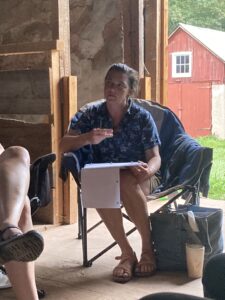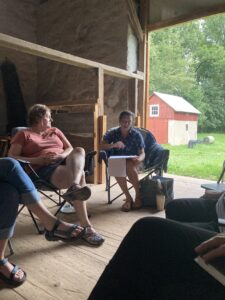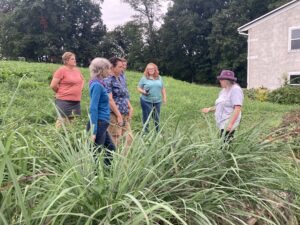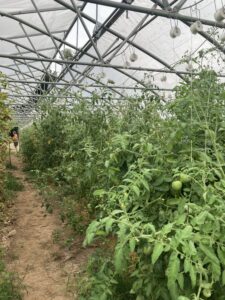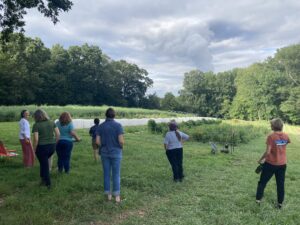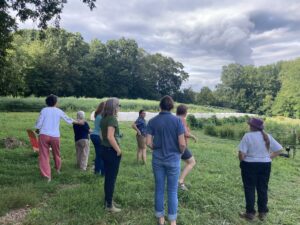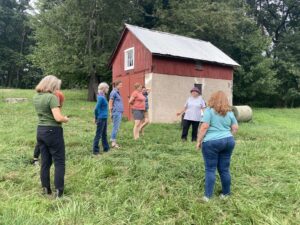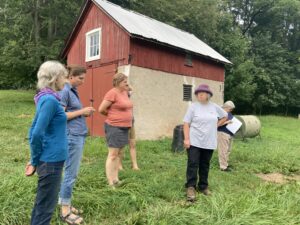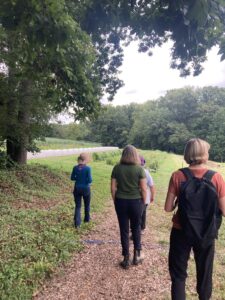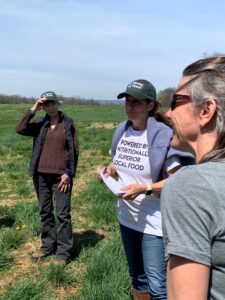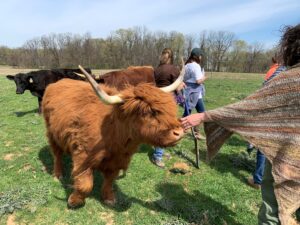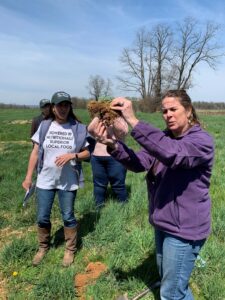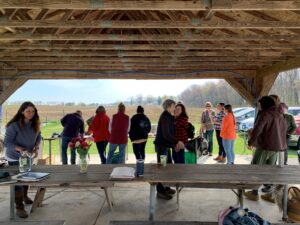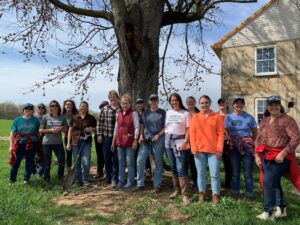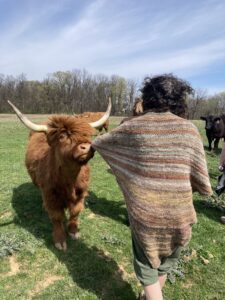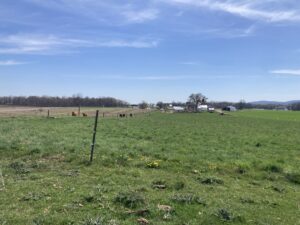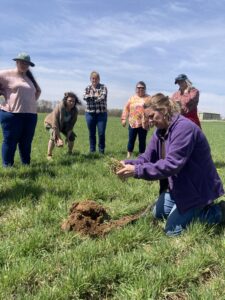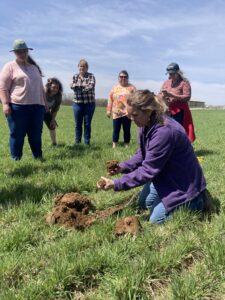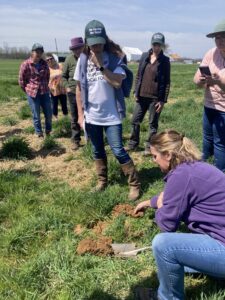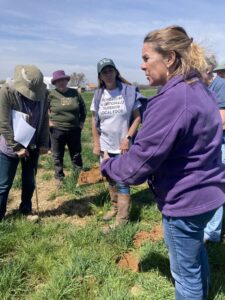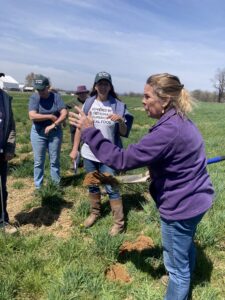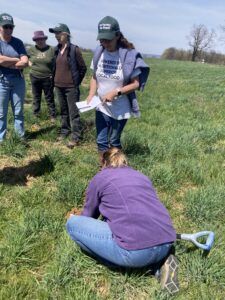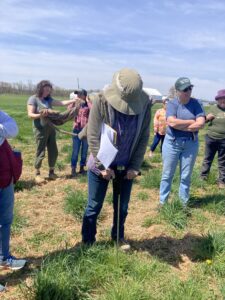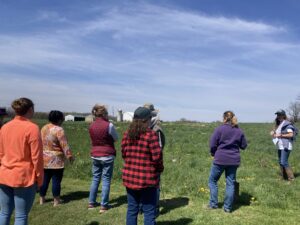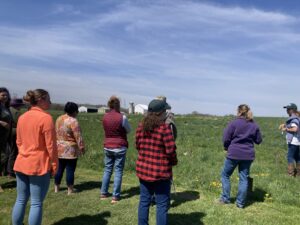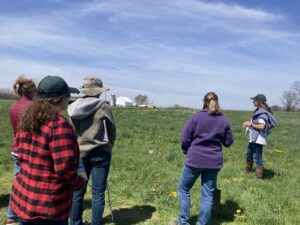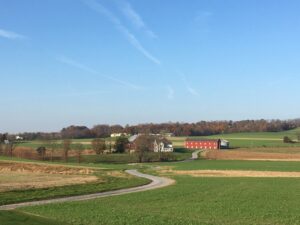Final report for LNE22-442
Project Information
Farmers in Pennsylvania’s Susquehanna River watershed became soil health experts and evangelists through Farmers for the Land: Helping Farmers Advance Soil Health in Pennsylvania. Over the course of three years, a cohort of producers representing small- and mid-sized flower, vegetable, grain, and pastured livestock production systems gathered in-person and virtually to be immersed in the principles of soil health, develop management plans to implement these principles on their own farms, and put these plans into action with support from small stipends and funding for specialized technical assistance.
This project catalyzed something more enduring than a single round of practice adoption: it built a community of practice among producers, grounded in mutual support, shared values, and actionable knowledge. This kind of social infrastructure is often overlooked in traditional conservation metrics, yet it is essential to sustained change. As research in both agricultural and social sciences shows, when farmers are connected through trusted networks, the adoption of conservation practices spreads more organically and endures longer.
As one of six states comprising the 64,000-square-mile Chesapeake Bay watershed, Pennsylvania has an enormous responsibility for ensuring that pollution and excess nutrients from cities, industries, and farms are stored and filtered before entering local waterways.
Despite their growing numbers, some farmers are not well served by technical and financial resources that help them manage their land for long-term sustainability. This fact is often due to a lack of knowledge by farmers about the resources available to them and how to access them.
Intentional education of and engagement with these farmers in agriculture is critical to achieve broader adoption of soil health and other conservation practices on America’s farmland. This project ensured specific farmers in Pennsylvania had the knowledge, skills, and access to technical and financial assistance they needed to adopt soil health practices on their farmland.
AFT recruited and trained 9 farmer in priority counties within the Susquehanna River Watershed in Pennsylvania to participate in virtual and in-person training and farm field days over eight months. Through AFT’s Farmers for the Land Learning Circle model, farmers received substantive technical assistance alongside peer support on soil health practices that promote long-term sustainability, including residue and tillage management, cover crops, nutrient management, and use and operation of key soil health management equipment. The curriculum was created and delivered by AFT and its advisory group made up of farmers and service providers.
To increase impact, AFT provided stipends to 7 Learning Circle participants to help defray the costs of adopting soil health practices on their farmland. Practices included soil health testing, nutrient management to support soil health, compost application, and prescribed grazing.
Additionally, AFT created a compelling case study that quantified the economic, water quality, and climate outcomes of a ‘soil health successful’ Pennsylvania farmer, as well as three soil health profiles focused on members of the PA soil health cohort to provide information and inspiration for other producers. These two-page publications highlight these farmers’ decisions to adopt soil health practices on their farms, the impacts on their farm productivity and profitability, and the resources that they found useful and valuable as they increased their confidence around making soil health decisions on their operations.
While many farmers believe the scientific evidence that soil health practices improve soil and water quality, they are reluctant to change management techniques without knowing how much the soil health practices will cost or benefit them. The PA soil health case study and profiles educate farmer audiences about the local benefits of soil health practices, reduce uncertainty, and result in increased farmer adoption of soil health practices.
Eight farmers will adopt soil health practices (residue and tillage management, cover crops, nutrient management, prescribed grazing, etc.) on 1,000 acres of farmland resulting in 10,000 pounds of nitrogen loss reductions, 3,000 pounds of phosphorus loss reductions, and 550 tons of sediment loss reductions, on average, per year.
EPA’s STEPL Tool in the Muddy Run-Mill Creek HUC12 in Lancaster County, PA was used to create this estimate assuming:
- 500 acres of cropland adopted early planted cover crops, conservation tillage with 60% residue, and nutrient management
- 500 acres of pastureland adopted prescribed grazing, pasture, and hayland planting and livestock exclusion fencing
As one of the six states comprising the 64,000-square-mile Chesapeake Bay watershed, Pennsylvania has an enormous responsibility for ensuring that pollution and excess nutrients from cities, industries, and farms are stored and filtered before entering local waterways. Pennsylvania farmers know that healthy soil is the foundation for clean water and productive land for people and nature. Significant investments have been made to improve soil health and reduce the impact of nutrients and sediment in Pennsylvania’s waterways and ultimately the Chesapeake Bay. As such, Pennsylvania has become a national leader in no-till planting (67 percent of acreage) and cover crops (37.2 percent of commodity acreage). Women, one subset of beginning farmers in the area, are entering the field as new farmers, widows, and inheritors of farmland in unprecedented numbers and thus are poised to play a significant role in agriculture in the years ahead.
Currently, women own or co-own more than 300 million acres (about one-third of US farmland). Many additional acres are in the hands of women who are “non- operators” but lease their land to neighboring farmers. In fact, roughly two million non-operating landowners own about 38 percent of all farmland in the US, and 37 percent of non-operating landowners are women.
Pennsylvania mirrors these national trends with 32,000 women farming and 2.3 million acres of farmland owned and farmed by women in Pennsylvania.
In the next two decades, approximately 371 million acres of US farmland are expected to change owners. Much of this land will likely transfer to beginning farmers, many of whom are likely to be women (one report predicts that women may own 75 percent of this transferred farmland). In Pennsylvania, 28 percent of farmers are over 65, illustrating the significant potential for an unprecedented increase in new agricultural landowners. Despite their growing numbers, some farmers are not well served by technical and financial resources that help them manage their land for long-term sustainability. In Pennsylvania, this is evident in the amount of financial agricultural assistance received: 25 percent of principal producers were female. 6.64 percent of federal government payments went to female farmers and the average payment to female farmers was 30.5 percent less than to male farmers receiving assistance. This is due in part to a lack of knowledge by some farmers about the resources available to them and how to access them.
For nearly a decade, AFT has worked to close the education gap and help thousands of farmers access conservation programs and adopt environmentally sound farming practices. AFT’s Farmers for the Land program model uses Learning Circles, dedicated networking and learning sessions aimed at helping farmers be better stewards of their farmland and support their access to resources at the local, state, and federal levels. This model has proved effective.
A 2019 peer-reviewed study of a subset of AFT’s Learning Circle participants from Indiana and Illinois founds that 73 percent of participants took subsequent farm conservation actions including talking with family and renters about implementing conservation practices as well as implementation of conservation actions on their farmland. Intentional education of and engagement with women in agriculture is critical to achieve broader adoption of soil health and other conservation practices on America’s farmland. This project ensured farmers in Pennsylvania have the knowledge, skills, and access to technical and financial assistance they need to adopt soil health practices on their farmland.
AFT and its advisory group recruited and trained 9 Learning Circle participants in priority counties within the Susquehanna River Watershed in Pennsylvania who participated in virtual and in-person training and farm field days over eight months. Through these Learning Circles, participants received substantive technical assistance on soil health practices that promote long-term sustainability, including residue and tillage management, cover crops, nutrient management, and use and operation of key soil health management equipment. Curriculum was created and delivered by AFT and our advisory group made up of farmers and service providers.
To increase impact, AFT provided stipends to 7 Learning Circle participants to cover some or all of the cost of adopting soil health practices on their farmland, including funding for one-on-one technical assistance. Practices could include cover crops, compost application, nutrient management to support soil health, planting to attract beneficial insects and pollinators, and prescribed grazing, among others. See below for more information about stipend eligibility.
As an addition to AFT’s published AFT-NRCS co-branded economic case studies (https://farmlandinfo.org/publications/soil-health-case-studies/), this project attempted to identify a female row crop farmer to include in the case studies. While many farmers believe the scientific evidence that soil health practices improve soil and water quality, they are reluctant to change management techniques without knowing how much the soil health practices will cost or benefit them. AFT’s place-based case studies inform producers about the benefits of soil health practices in their own contexts, reduce uncertainty, and result in adoption of soil health practices.
Because of the complexity of the analysis, however, these case studies require producers to fit within a specific set of parameters with regards to crops produced; practices implemented; and implementation time frame. After a year of intensive outreach, we were unable to identify a single female crop producer who fulfilled all the necessary economic case study criteria.
As a result, AFT staff created Pennsylvania’s first soil health economic case study focused on William Thiele, a dairy farmer who produces corn, oats, and soy on his family’s 295-acre farm using reduced tillage and cover cropping. Additionally, AFT created three compelling two-page profiles that describe the decision-making and impacts of cohort participants who successfully adopted at least one soil health practice. These profiles, published on our Farmland Information Center (FIC), highlight how soil health management systems can be an integral part of successful women-run farming operations, contributing improved production, marketing opportunities, and land conservation, among other benefits.
As a result of this project, eight farmers adopted soil health practices that included residue and tillage management, cover crops, nutrient management, compost application, pasture and haylage planting, and prescribed grazing, on 182 acres of farmland.
These practices resulted in 715 pounds of nitrogen loss reductions, 210 pounds of phosphorus loss reductions, and 101 tons of sediment loss reductions, on average, per year into the Chesapeake Bay.
Cooperators
- (Educator)
- (Educator)
- (Educator)
Research
Education
Engagement
AFT and its advisory group harnessed our deep networks to identify and recruit 9 farmers from priority counties in the Susquehanna River Watershed in Pennsylvania and offer multiple in-person and virtual learning opportunities, along with one-on-one technical assistance, over the course of two years.
AFT recruited farmers who identified themselves as decisionmakers on their farms and curious about implementing soil health practices, and who were able to commit to participating in the cohort. AFT offered participation stipends to cover travel, childcare, and other expenses to incentivize engagement over the long timeframe of the project.
Additionally, AFT provided stipends to 7 stipends to implement new soil health practices and access technical assistance. While our stipends were initially $2,000 per year, underutilization and a landscape shift in funding availability during the course of the project, whereby much more significant funding for soil health practices became available through the Partnership for Climate-Smart Commodities projects and IRA-funded EQIP and CSP cost share, led us to increase the stipends after approval by our grant contact. We ultimately offered a maximum of $3,500 in implementation stipends annually per farmer for two years, with an additional $1,000 per farmer per year available for technical assistance consulting.
Participants receiving implementation stipends committed to two years of practice implementation on the same field. Stipends were made to participants with livestock and crop (grain, forage, fruit, and vegetable) farms. Approved practices included:
- Conservation tillage and residue management
- Multi-species cover crop mixtures
- Extended season cover crops
- Prescribed grazing
- Nutrient management for soil health
- Compost or other organic soil amendment application
- Soil health testing
- Planting to attract beneficial insects and pollinators
Though they were excited about the potential for consulting and technical assistance funding and engaged in numerous conversations with project staff about consultant options, only a few cohort participants made use of the stipends. Some farmers identified TA providers who did not need funding, or who were funded through other projects. Others had trouble coordinating with their consultant, or were challenged to identify a consultant who could meet their specific needs. As a result, we found ourselves with excess technical assistance funding and reached out to our partners at Pasa to see if they could support additional farmers in their citizen science research and support project.
In fall of 2024, three cohort participants were enrolled in Pasa’s Soil Health Benchmark Study as a component of technical assistance (two participants were already enrolled in the study when the project began). These farmers received assistance collecting soil samples and submitting management records to compare their management practices and soil health outcomes with a cohort of peer producers via the Cornell Comprehensive Assessment of Soil Health (CASH). See the attached report from Pasa, which includes examples of CASH results from each enrolled farm as well as field maps and a timeline of producer engagement.
Learning
“During interviews, we heard variations on the theme of these farmers consciously or unconsciously undervaluing the validity of their farming operation and filtering themselves out of categories that would put them in the way of opportunities for technical and financial assistance. It is important to note the connection between this dynamic and the underlying cultural norms that signal that they and/or their ideas or operations are less legitimate.” -- AFT State of Gender Equity in US Agriculture report, 2024.
Rigorous, tailored instruction in soil health principles and practices was a key component of this project, affording cohort participants both increased assurance in their own knowledge and education and the sense that their farming operation was valued and supported by project conveners and trainers. Reinforcing these attitudes is critically important to ensuring that producers have the confidence and knowledge to implement innovative soil health practices on their operations.
For example, as one participant shared in a private communication: “truthfully I would never have had the confidence to put my animals in that field if I hadn't tested the waters through this soil health program! I felt like SUCH A BOSS last summer when I successfully grazed my animals along the old fencerow and then into the groovy meadow so so very far from my house THEN RAN them home and they all followed. It was amazing and a big boost of I CAN DO THIS.”
See the attached curriculum for specific agendas and topics covered in each in-person and virtual Learning Circle. While our original project proposal envisioned a greater emphasis on non-operating landowners, the curriculum as implemented focused exclusively on responding to the needs identified by the female farm owner-operators represented in the cohort. Only one farmer in the cohort leases land, and while her soil health management was definitely impacted by concerns about making investments on land she does not own, and about actions by her neighbors that directly affect her operation, she was comfortable enough negotiating with her landowners that she did not require additional support in that area.
AFT created a case study of a farmer in Pennsylvania (separate of the cohort participants) who has successfully implemented soil health practices. The case study includes:
- Economic outcomes the farmer has witnessed from the adoption of the soil health practices, including a partial budget analysis of the benefits and costs associated with each adopted practice.
- Water quality outcomes the farmer has witnessed from the adoption of the practices, using USDA’s Nutrient Tracking Tool to quantify reductions in nitrogen, phosphorus, and sediment from the adoption of the practices.
- Greenhouse gas outcomes associated with the adoption of the practices, using USDA’s COMET-Planner tool to calculate an estimate of the soil carbon sequestered, nitrous oxide gas reduced, and methane gas reduced from the practices.
The case study was shared and discussed with Learning Circle participants and service providers. AFT has published twenty-three such case studies which can be found at https://farmlandinfo.org/publications/soil-health-case-studies. To date, AFT has not produced a case study featuring a female farmer.
Evaluation
AFT conducted a needs assessment in September 2022 to identify, understand, and prioritize the needs of participants so that the advisory group could adapt the curriculum and training delivery accordingly.
AFT collected two forms of evaluation data as part of this project. First, Learning Circle participants and service providers provided feedback via exit surveys to give a quantitative assessment of impacts. These exit surveys were sent after some Learning Circles, but engagement with surveys dropped as the cohort became more cohesive and implementation began.
AFT also collected primary data during the end of year two, in the form of qualitative interviews with a subset of Learning Circle participants and service providers. Additionally, we tracked the work of the participants implementing soil health practices through ongoing conversations with producers throughout the project period.
AFT quantified the following results based on their completion in the project timeframe:
- Four farm field days for the Learning Circle participants, advisory committee members, and agricultural service providers.
- Cohort of nine trained farmers and landowners ready to take soil health action on their farm and a new network of support among farmers in agriculture and service.
- Seven farmers adopting new soil health practices on their farmland.
- Creation of one case study of a Pennsylvania farmer successfully implementing soil health management systems, three soil health profiles of Pennsylvania female farmers, and one Soil Health Champion video funded by a Pennsylvania Conservation Innovation Grant.
Milestones
Milestone 1: Establish advisory group; adapt Learning Circle curriculum for cohort (Engagement)
Status: Completed 12/31/24
A. 6-8 advisory group members (four farmers and five service providers):
- Our advisory group was established in early 2022 and provided support for curriculum development and learning circle coordination. One of the farmers identified in our original application (also a service provider working for NRCS) determined that the work of the project was too close for her to work as a grazing specialist for NRCS and was concerned about a conflict of interest; she declined to participate as an advisory group member. Mary Barbercheck of WaGN and Penn State replaced Kathy Braser on the advisory group.
- In 2024, we reconstituted our advisory group due to non-participation from the original farmer members. For the second year of implementation, advisory group members were not involved in curriculum development, so their main role was to assist with continued participant engagement and connections to other programs and resources as well as curriculum and program evaluation.
- Newly recruited farmer members of the advisory group participated in a review of and feedback session focused on the soil health curriculum developed as a result of this project. Farm service providers, especially Sarah Bay Nawa with Pasa and Lisa Blazure with the Stroud Water Research Center and the PA Soil Health Coalition, continued to be great resources for farmers in connecting them with additional resources and programs.
B. Farmers will engage with the curriculum to learn why soil is important in farming operations, soil health terminology, general soil health, and how to implement soil health practices, including cover crops, water quality, nutrient management, and how to communicate with landowners about soil health practices
- 3/21/22 update: See attached curricula, including overall project curriculum and more detailed individual session curricula. Because the content of the learning circles is somewhat responsive to identified participant needs, participant agendas are being developed in preparation for each learning circle
- Attachment 1: Grouped Participant Agendas for October 26, January 6 and December 1 and Soil Health Learning Circle Curriculum.
- Status 1/31/24: Completed, except for rebuild of advisory group
- Accomplishments 1/31/24:
- The Farmers for the Land model focuses on preparing discussion leaders – often highly skilled resource professionals -- to engage with participants in a unique way. During a learning circle, participants and discussion leaders are encouraged to introduce themselves personally, and to interact with one another as peers. While discussion leaders bring technical expertise and knowledge of available resources, participants bring lived experience and wisdom to a conversation on any conservation topic. In addition, while learning circles may focus on conveying specific information, they also emphasize sharing experiences, intensive question-and-answer periods, and connecting farmers to resources and to one another. The curriculum that was developed through this project was driven largely by the participants’ needs and interests, as identified in the needs assessments they completed prior to the beginning of the cohort. Each learning circle, whether virtual or in-person, included similar components and structure, including extensive introductions and check-ins, a focused presentation and discussion with a knowledgeable resource professional on a particular topic identified by the cohort, and next steps/ homework that kept participants engaged until the next learning circle session.
- Creating an adaptable, responsive curriculum focused on participant needs and peer-to-peer support, including ample time for co-learning and skill building, enabled cohort participants to “live into” soil health assessments, principles, and practices. Participants increased their fluency in the language and practice of soil health, enabling them to communicate more effectively with technical service providers and consultants about their farm’s specific soil health needs and goals. Discussion leaders became trusted advisors, and several expressed that the learning circle cohort was a rewarding professional experience for them as technical assistance providers in addition to a valuable teaching tool for participants.
- Our final surveys and interviews with cohort participants demonstrate the effectiveness of the curriculum. One hundred percent of survey respondents rated their knowledge of soil health principles and practices as “better” or “much better” than before the learning circle series. Eighty-three percent said that they were “much more interested” in trying new soil health practices on their farms, and the same percentage responded that they felt “much more connected” with other farmers working to improve their soil health. One hundred percent said that they were either “more aware” or “much more aware” of financial and technical assistance resources available to support them in improving the health of their soils, and every respondent rated the learning circle approach as “excellent” compared with other types of farmer education in which they had taken part.
- Update 1/25. Status: completed. Farmer advisory group members participated in a curriculum review that included an initial virtual meeting to introduce advisors to program staff, goals, and strategy; creation of a shared online folder with curriculum and other resources as well as a guidance document; a feedback form to gather information from advisors; and a follow-up group conversation in April 2024 on program structure and impacts. Farmer advisors were very engaged in this process and provided valuable insights through both the feedback form and the circle session which we will share in the final report.
- 1/24 Attachments:
- Grouped under Attachment 2: Participant Agendas for January 6, February 15, March 15, April 11 and August 29.
- 1/25 Attachments
- Grouped under Attachment 3: Farmer Advisor guidance document, Farmer Advisor Feedback form and Farmer Advisor feedback form response.
Milestone 2: Identify and recruit participants for Learning Circle cohort (Engagement)
Status: Completed 1/31/2024
A. 10-15 farmers
B. Through recruitment, farmers will become aware of the Learning Circle cohort and the new skills and resources that they will learn; interested farmers will sign up for the Learning Circle cohort.
C. 6/30/22
- See attached recruitment materials, developed in consultation with our advisory group. Recruitment began in June of 2022 and extended through the summer.
- Advisory group members and cooperators assisted with outreach in targeted counties.
- The cohort structure was a new model for our Farmers for the Land work in Pennsylvania, so we experimented with a slightly different internal recruitment mechanism whereby participants who used our WFL website link to express interest then went through a simple screening process to determine commitment to the cohort model and appropriateness for the project. See attached needs assessment survey, which helped identify level of familiarity with materials and commitment to soil health goals in participating farmers. We continued to cast a wide net for cohort participants until late October, when we hosted our first in- person soil health learning circle.
- Attachments: Milestone 2 Soil Health Social Milestone 2 WFL Soil Health Flyer MIF080~1
- Update 1/31/24 Status: Completed
- Accomplishments: In all, we ended up with a cohort of nine farmers: two diversified vegetable and livestock farmers; two pastured livestock farmers; one vegetable farmer; one dairy, crop, and flower farmer; one beginning farmer with a focus on vegetable production and farm-based education; one small-scale organic grain producer; and one small-scale flower farmer. Participation was very high at the in-person and virtual learning circle events, and engagement was significant among cohort members on their own social media feeds outside of ‘official’ project communications channels. The needs assessment survey was useful both to help shape the curriculum to the experience and educational goals of the participants and also to ensure that registrants were engaged with the project from the beginning.
- During the proposal writing process, we anticipated that our recruitment would result in a cohort who represented the largest commodity groups in Pennsylvania, including grains, poultry, dairy, and nursery crops and floriculture. However, our final cohort included only one small but groundbreaking organic grain operation and two small-scale flower growers alongside pastured livestock and vegetable producers. Our outreach focused on finding a soil health successful grain farmer (see Milestone 3) further illuminated the fact that female farmers, and likely particularly those who are seeking community and support, tend to be concentrated in less traditional production systems. AFT’s 2024 report, The State of Gender Equity in U.S. Agriculture, elucidates some of the reasons behind, and implications of, this difference.
- The fact that the participants in our cohort are faithful reflections of this national discussed in the linked report above. Their commitment to the learning circles and to one another, noted in their connections online and frequent “likes” and comments on one another’s social media posts (see Milestone 12 for details), was unexpected but speaks both to the desire of many farmers for peer-led, nontraditional technical assistance and to their yearning for connection to each other. As we recruit for a new cohort of farmers in Virginia, we are experiencing many of the same dynamics – participants are not sure what to expect, they are excited for the connection to others but want to make sure the commitment is worth their time, and they are eager for access to specific resources (one PA cohort participant revealed that she was “just here to get some money for cover crop seed” early on, but has since become one of the most engaged and committed participants for reasons other than funding). Cohort participants in PA, however, are now asking whether there will be an additional opportunity for themselves or friends to participate in a learning circle cohort again, proving that these farmers can serve as effective recruiters themselves should we secure funding to continue this type of farmer-led co-learning in the region.
Milestone 3: Identify a soil health successful farmer for economic case study; conduct farmer interview; analyze data for soil health economic case study; finalize case and share with farmers in cohort (Learning)
Status: Completed 1/2024
A. One farmer
B. Cohort of farmers will learn about the economic, water quality, and climate outcomes of a farmer in Pennsylvania who has successfully adopted soil health practices
C. 12/31/22; 3/31/23; 6/30/23; 9/30/23
- We began recruitment for a soil health successful farmer in early 2022, particularly working through our advisory group and other project partners. AFT's Soil Health Economic Case Studies model requires that the subject be a row crop farmer who has been implementing one or more soil health practices for between 4 and 15 years and has a positive soil health and economic story to tell. We were surprised by the challenge of finding a female row crop farmer who met the requirements of the case study. As of January 2023, we have done extensive interviews with a small-scale organic grain producer, Teena Bailey of Red Cat Farm. While Teena's operation ultimately does not appear to be a good candidate for a retrospective case study due to her ongoing experimentation and very small-scale, we are excited to create a simple profile on her operation as a part of the project. In the meantime, outreach is ongoing for a row crop farmer. Because AFT's Soil Health Economic Case Study team has significantly expanded thanks to a recent NRCS cooperative agreement, we now have the assistance of Lia Raz, AFT Conservation Agronomist, who will co-lead our outreach and facilitate the development of the case study once an appropriate subject is found. See attached recruitment materials. Our timeline for development of the case study remains on track.
- The NRCS Cooperative Agreement will also fund the time originally budgeted for the Soil Health Economic Case Study team on this project, including Michelle Perez, Ben Wiercinski, Ellen Yeatman, and Agronomist 1. As a result, while we will continue to report on the milestones and targets associated with this portion of the project, we are submitting a budget amendment request in conjunction with this annual report to shift a portion of the requested funding from the case study team to provide individualized technical assistance for cohort participants. (see "Assessment of project approach / areas of further study needed", below). We will report on this portion of the project under Milestone 7.
- Attachments: Milestone 3 Recruitment Materials
- 1/2024 Update. Status: Completed
- Accomplishments: As discussed in both last year’s project progress report and AFT’s 2024 Gender Equity in U.S. Agriculture, some farmers are not well served in row crop commodity agriculture. In addition, the requirements of AFT’s Retrospective Soil Health Economic Calculator (R-SHEC) tool limit the pool of eligible farmers even further with specific parameters around the types of qualified soil health practices and the number of years in particular practices. As a result, despite extensive outreach to nearly two hundred farmers and farm service providers in PA and seven in-depth interviews with farmers, we were ultimately unable to locate a female farmer who qualified for the R-SHEC analysis. Instead, AFT’s Soil Health Economic Case Study team completed a case study on William Thiele, a crop and dairy farmer from Butler County, PA (linked in attachments), while our Mid-Atlantic team created two soil health profiles focused on participants in the cohort. These soil health profiles are the first exclusively featuring such producers on the AFT Farmland Information Center (FIC), and while they were not subject to the same rigorous economic analysis and review as the official economic case studies, they are powerful inspirational and educational tools for farmers in the Mid-Atlantic region interested in adopting soil health practices. They illustrate the stories of farmers characteristic of the region in terms of scale, production system, and selected soil health practices, and also demonstrate the breadth of available technical and financial assistance available for soil health, from Pennsylvania Association for Sustainable Agriculture (Pasa)’s Soil Health Benchmark Study to NRCS conservation plans and cost-share. We proposed a session focused on the Teena Bailey profile at the 2024 Pasa conference, but unfortunately it was not selected in a highly competitive year for sessions. We hope to try again with a proposal for the 2025 conference and possibly other local farmer-focused conferences.
- Attachments:
- Update 1/25: Due to the availability of additional funds, we received approval from our NESARE POC to create an additional Soil Health Profile of Amanda Lee Milner, the host of the final learning circle funded by this project. That profile is in progress and we look forward to sharing it as a part of our final report. Existing printed versions of soil health profiles have been extremely popular at outreach events where AFT has tabled.
- Final update 4/25: Mid-Atlantic Outreach and Communications Senior Specialist Elizabeth Beggins completed Amanda Lee Milner’s Soil Health Profile in February 2025, and it has been posted to AFT’s Farmland Information Center alongside the previous two profiles. Together, the profiles represent farmers run grain, pastured livestock, and diversified operations implementing soil health practices across 200 acres in the Susquehanna and Chesapeake Bay watersheds. Though we were unable to identify a farmer who met the parameters of the R-SHEC tool and therefore AFT’s ‘official’ Soil Health Economic Case Studies, given the lessons of this project as a whole, which call out the power of stories and experiences as motivators for change, we are extremely proud of these story-driven profiles and hope to use them as educational and inspirational tools for years to come.
Milestone 4: Host six Learning Circles and two farm field days (Learning)
Status: Completed 1/2024
A. 10-15 farmers
B. Farmers will attend Learning Circles and farm field days and learn about the benefits of soil health practices and how to implement them on their farmland
C. 10/1/22-6/3/23
- Our first on-farm field day took place October 26th at Hameau Farm in the Big Valley, hosted by advisory group member and dairy farmer Gay Rodgers. Farmers were able to learn from service provider discussion leaders including advisory group member Lisa Blazure, who presented on the principles and essential practices of soil health, NRCS staff member Melissa Erdman, who led discussions on the NRCS Soil Health Card and Pasture Assessment, and Penn State graduate students Madeline Luthard and Zoelie Rivera-Ocasio and undergraduate Heer Patel, who led hands-on demonstrations of additional soil health assessments including aggregate stability, active carbon, and microbial respiration. Participants shared their overall goals for their farm operations and for the health of their soils. Host Gay Rodgers discussed her participation in the Pasa Soil Health Benchmark Study and her approach to building soil health in the context of her pastured dairy operation. Additional NRCS staff shared resources available to producers to assist with business development and soil health management and expressed their appreciation for opportunities to connect with farmers and to learn about soil health basics and soil health assessment. See attached evaluation results.
- The first virtual Learning Circle was held December 1, and featured advisory group member Mary Barbercheck leading a discussion on soil health practices. The second included advisory group member Sarah Bay Nawa of Pasa Sustainable Agriculture sharing the results of the soil health benchmark study, in particular the ways in which particular practices contributed to soil health outcomes. She focused on row crops, vegetable operations, and pastured livestock producers since our participating farms include all of these production systems. Practices covered included tillage reduction, cover crops, nutrient management, and more. See attached evaluation results for the first two virtual learning circles.
- Attachments: MI9675~1 Milestone 4 Hameau Farm Learning Circle Evaluations
1/2024 Update
- Status: Completed
- Accomplishments:
- The third virtual learning circle was held February 15, 2023, with discussion leader Lisa Garfield from Future Harvest walking participants through the soil health management planning process using the template she developed for the Million Acre Challenge.
- The fourth virtual learning circle was held March 15, 2023, with peers and advisors helping cohort participants workshop and refine their soil health management plans.
- The second on-farm learning circle was held on April 11, 2023 at Rowantree Farm, a diversified vegetable and livestock farm in Mechanicsburg. Host and cohort participant Rowan Miller, who recently purchased a 100+ acre farm and is in the process of converting it from conventional commodity crops to rotationally grazed pasture, was also the subject of one of our soil health profiles and a ‘soil health champion’ video funded by the PA-CIG award that supported the learning circles themselves. Rowan led cohort participants on a farm tour during which Lisa Blazure from the Stroud Water Research Center and PA Soil Health Coalition sampled individual fields, comparing them with soil test results and nearby hedgerows. Cohort participants also had the opportunity to present their soil health management plans to the group and received feedback from advisory group members and partners as well as guests from NRCS and Capital RC&D.
- By popular demand, we were able to organize a ‘bonus’ on-farm twilight learning circle at Dorene Pasekoff’s Hill Creek Farm in Pottstown on August 29. This learning circle focused on discussions of the ways cohort participants were experiencing climate impacts on their farms, and the specific ways that they saw their soil health practice implementation helping them adapt to these impacts. Cohort participants also toured Hill Creek Farm, a highly successful specialty vegetable, herb, and seed operation that Dorene has carefully right-sized to her interests, available labor, and financial goals.
- Our final surveys and interviews with cohort participants demonstrate the effectiveness of the learning circle cohort model. One participant commented, “This learning circle truly brought a group together and kept us together and held us accountable! Other learning circles have been great as far as content but then you are left on your own.” Another responded, “being able to see other farmer’s operations and having the chance to hear other’s stories and just talk has helped alleviate the sense that I am alone as a farmer. I have learned from what I’ve seen and heard at the Learning Circles.” A third farmer noted that she appreciated "the initial instruction and continued follow through,” while a fourth put it succinctly: “The learning circle model works. Interested in seeing what else AFT comes up with.” This participant applied and was accepted to an AFT Climate Adaptation and Mitigation Fellowship program for vegetable and small fruit producers, and we are excited to see what she will do with her fellowship!
1/25 Update
- Because of some available funding, we received approval from our NESARE POC to organize an additional learning circle for participants and farmer advisors in November 2024 at Amanda Lee Milner’s Highfield Hollow Farm in Gardners, PA. Participants shared their experiences with soil health practices over the course of the 15 months since they had last met in person. Amanda shared her experience leveraging project funding to secure funding from Capital RC&D and participants took a tour of her farm focused on her pasture seeding and rotational grazing practices. The camaraderie and common language of soil health shared by the participants was evident as they enjoyed a meal and a beautiful fall day learning about Amanda’s practice implementation and the benefits it had already brought to her family’s farm.
- See photos from learning circle events attached.
Milestone 5: Eight Learning Circle participants create plan to implement soil health practices; AFT and advisory group review and approve plans (Learning)
Status: Completed 1/2024
A. Eight farmers
B. Farmers will create a plan for implementing soil health practices on their farmland with support from the advisory group
C. 3/31/23
- This milestone is in process as of January 2023. Cohort participants have used an online “homework” assignment to create generalized soil health goals for their operations and to outline their assessment methods. In February, Lisa Garfield from Future Harvest will present her template for a producer-focused soil health management plan, enabling cohort participants to create a draft management plan for their operations. Essential elements of these plans will include soil health constraints or challenges as identified through the assessment methods selected by participants, reasonable, attainable goals to address these challenges, and specific practices that can be implemented on participant operations to meet these goals. AFT staff and advisory group members will review plans and offer support for revisions. One-on-one meetings between AFT staff and cohort participants in January 2023 are also supporting the development of soil health management plans. See attached “homework” results for level of engagement and sample participant goals. See also attached soil health management plan template developed by the Million Acre Challenge.
- Attachments: Milestone 5 Farmers for the Land Soil Health Cohort Homework #1Milestone 5 MAC Soil Health Management Plan Template
1/2024 Update. Status: Completed
- Cohort participants completed soil health management plans during Learning Circles #3 and #4, and presented them to one another and service providers at the in-person Learning Circle at Rowantree Farm in April. After Lisa Garfield presented the framework for the SHMP during Learning Circle #3, and AFT staff met one-on-one with cohort members to answer questions and help them set goals for their soil health management during the 2023 growing season. Participants were able to workshop their draft plans with their peers and advisory group members during the next Learning Circle in March. At Rowantree Farm, each cohort participant presented her soil health management plan, including her methods of soil health assessment, which soil health principles she was focusing on, what practices she wanted to implement and what resource concerns, if any, she was planning to address with her SHMP. Participants were highly invested in and inspired by their peers’ successes and very supportive of their challenges. The soil health management plan proved to be an effective framework for incorporating soil health priorities into a whole-farm perspective.
- Attachment 5: Soil Health Management Plan for Amanda Lee-Milner and High Hollow Farm (example of SHMP from a cohort participant)
Milestone 6: Eight Learning Circle participants are awarded implementation stipends (Engagement)
Status: Completed 1/2025
A. Eight farmers
B. Farmers receive stipends
C. Year 1: 6/30/23; Year 2: 6/30/24
1/24 Update: In Progress
We are pleased to have awarded stipends to seven cohort participants in 2023 to implement soil health practices. They are as follows:
- Suzanne Shea, Old Sword Farm. Soil Food Web approach for integrated pest management (IPM); application of biologically complete compost and/or compost extract; and managed grazing integration
- Caitlin Gabers, Herb & Sprouts Homestead. Soil testing; refining compost production through purchase of bagger for mower; crop rotation; addition of biological amendments
- Lelayna Yarnell, Amity Springs Farm. Soil testing and assessment; additional infrastructure to improve rotational grazing practice; compost extract preparation and application.
- Christine Williams, Little Swatara Creek Flowers. Soil health evaluation on multiple areas; soil sampling for nutrient management; addition of organic amendments and compost tea; nutrient analysis on compost and compost tea; implementation of no-till on row crops and pasture seeding; interseeding of legumes and grasses; no-till seeding of wildflower/ pollinator mix.
- Amanda Lee-Milner, Highfield Hollow Farm. No-till seeding of soil health mixes with specific goals into hay fields and pastures.
- Dorene Pasekoff, Hill Creek Farm. Soil health testing and assessment; goal-driven cover crop seeding.
- Teena Bailey, Red Cat Farm. Tillage reduction; goal-driven cover cropping; compost application.
1/25 update: completed. In 2024, we provided an increased stipend of $3500 to six of the seven participants to continue their practices and update their soil health management plans after a winter meeting with AFT staff. Lelayna Yarnell did not request her 2025 stipend, although she did attend the learning circle, updated her soil health management plan, and continued her soil health implementation. All other participants received their stipends by August 2024.
Milestone 7: Learning Circle participants implement soil health practices; receive technical assistance as necessary (Engagement/Learning)
Status: Completed 1/25
A. Eight farmers
B. Farmers sample soil to collect baseline for comparison; farmers implement soil health practices on their farmland; farmers sample soil after two years to compare soil health after practice implementation
C. Year 1: 9/30/23; Year 2: 9/30/24
1/24 Update: In Progress
Accomplishments: AFT staff are currently meeting with cohort participants one-on-one to discuss soil health assessment and soil testing results from fall 2023 and assess participant interest in the Pasa Soil Health Benchmark Study. During these one-on-one meetings, we are also evaluating the successes and challenges of soil health practice implementation on cohort farms in 2023. Cohort participants appreciate the follow-up and opportunity to connect one-on-one. We have experienced some attrition in project participation following the completion of the learning circles and are currently considering ways to re-engage our farmers. Following the completion of our winter one-on-one check-ins, and based on the information we gather from surveys and in-depth interviews and potential budget revision requests, we will initiate one or more strategies to encourage re-investment on the part of our producers, including offering to fund their participation in the Benchmark Study, connecting them with additional funding through the Pasa Climate-Smart Agriculture project, highlighting one or more of them as the subject of a blog post or additional soil health profile, or something we have not yet determined. Based on the results of our interviews and reflections, we hope to propose a budget revision for 2024-25 that will enable us to most effectively meet our deliverables while remaining responsive to changing conditions in the region (see Areas for Further Study for more on this). We are finding that maintaining producer attention and engagement over the course of more than two years is both labor intensive and deeply rewarding.
1/25 Update: Completed
Accomplishments: Over the course of the late winter and early spring 2024, cohort participants updated their soil health management plans and soil health practice implementation targets. AFT received approval from our NESARE POC to provide funding for Pasa to integrate three additional producers from the cohort into the Soil Health Benchmark Study. These producers – Amanda Lee Milner, Dorene Pasekoff, and Christine Williams – received comprehensive onboarding visits from Pasa staff to acquaint them with the specifics of the Benchmark Study, identify fields that they would like to study, and familiarize them with the record-keeping requirements and technology. As Benchmark Study participants receive free registration to Pasa’s annual conference, we’ve been delighted to see social media posts from two of these farmers highlighting their attendance at the conference and particularly their interest in sessions on soil health. Dorene Pasekoff is also continuing to educate peers as a member of the Climate Adaptation and Mitigation Fellowship, where soil health practices are forming a key foundation for her climate adaptation and mitigation risk management plan. Another cohort participant is currently working with urban farmers in Baltimore City Maryland and in flood-ravaged areas of North Carolina to support them in healing and building their soil.
These farmers have integrated healthy soils principles and practices into their vocabulary and mindset in a profound way. The fact that they feel comfortable educating peers and customers about their soil health work with confidence in their own expertise and experience is a testament to the power of the Farmers for the Land approach, especially when paired with wise and generous technical assistance providers. We look forward to evaluating the outcomes of soil health practice implementation in our final report, with input from Pasa, alongside a final survey of cohort participants.
Amanda Lee-Milner (FB posts):
November 8, 2024: “Today I was honored to host the AFT Farmers for the Land Soil Health Learning Circle at our farm. This group of farmers have been a support and confidence booster for the last two years. There is something magical that happens when we form intentional community with each other. In our case, the grass gets greener and the soil gets healthier. At the end of the farm tour this afternoon, one of the farmer who has been providing me with technical assistance said, ‘I am so proud of you and all you have done.’”
January 29 “Pastures in 1974 vs 2024. This is what 50 years of conservation efforts, land management, grass farming, and generational stewardship produces. The pastures in 2024 are a direct result of farm management and [my father] teaching my sister and me how to be conservation-minded farmers.”
February 6: “Pasa Sustainable Agriculture conference… attending lectures on soil health, silvopasture, rotational grazing, agroforestry, and marketing. My name tags say ‘farmer’ and ‘farmer researcher’. 2024 was our first year in Pasa’s Soil Health Benchmark Study (hence, ‘farmer researcher’).”
Suzanne Shea (FB comments): November 8: “Thank you for your hospitality, Amanda. The weather was beautiful, the views were beautiful, and the information you shared was transformational. Thank you for sticking with it when it got hard and blazing the way for the rest of us.”
Milestone 8: AFT measures nitrogen and phosphorus reduction resulting from soil health practices
Status: Completed 4/2025
A. Eight farmers
B. Using EPA’s STEPL Tool, AFT will measure load reductions from eight farmers’ fields (Evaluation)
C. 2/28/25
Update 1/25: In progress. We will report on this analysis in our final project report.
Update 4/25: Completed
Milestone 9: AFT assesses impact of curriculum and training for farmers (Evaluation)
Status: Completed 4/2025
A. 10-15 farmers
B. Farmers complete a needs assessment before the training to identify, understand, and prioritize the needs of participants so that the advisory group can adapt the curriculum; farmers complete exit surveys and follow-up interviews to track progress more purposefully on program impact
C. Year 1: 9/30/22; Year 2: 9/30/23
1/24 Update. Status: In Progress
Accomplishments: As mentioned above, we are in the process of completing follow-up interviews with program participants. Needs assessment and exit survey results are included in attachments, and reflect the positive impact of the learning circle cohort model and the curriculum on participants’ experience. The following unsolicited social media posts and emails speak to the qualitative impact of the project:
- Cohort participant, social media post 2023: “Over the past few months, I have been participating in Farmers for the Land learning circles... these seven sessions have been an amazing learning tool, to help me understand better how to manage the soil at our new farm, using sustainable management, livestock rotational grazing, soil testing, etc. Not to mention the connections made with some amazing farmers, PASA, NRCS, and SARE, etc.
- If you are a farmer or have a connection to land you are trying to manage in a more sustainable way, come and join us April the 11th at my new farm, in the afternoon.”
- Cohort participant, social media post 2023: “OMG tomorrow is TOMORROW!
- I have been in this soil learning circle since the fall and I’m thoroughly looking forward to seeing my soil farmers again in person tomorrow. Also it’s the culmination of a lot of work for all of us – excited to present soil management plans! And over the top pumped to nose around Rowan’s new farm!”
- Cohort participant, social media post 2023: “I was excited about today in advance and would’ve been even if the weather were dull. But wow we had the bright sun shining down on us all day. And an amazing location at Rowantree Farm.
- Soil Health led by farmers. 9 of us did the learning circle and presented our soil management plans today. I’m so engaged with this group that I truly look forward to updates from each Farmer on their various projects. Full steam ahead! Let’s do this!
- So many thanks to the American Farmland Trust and to each of participants.”
- Cohort participant, social media post 2023: “Final in-person session for the Soil Health for Farmers sponsored by American Farmland Trust. It is inspiring to hear what the other farmers are doing on their farms to promote soil health and spend time with these conservation minded farmers.”
- Cohort participant, social media post 2023: “I’ve been part of the Soil Health for Farmers learning circle since last year and had a great day seeing the rest of the crew today at Rowantree Farm in Mechanicsburg.
- I’m grateful for the support, training, and cohort camaraderie as we all work towards improving soil health on our farms!”
- Service provider/partner email, 2023: “I had so much fun at the RowanTree Farm learning circle. That is an amazing group of farmers! I learned a lot from them. I wish all of my extension activities were so pleasant - I really can't think of a much better way to have spent the day!”
- Service provider/ partner email, 2023: “Thank you SO much for inviting me to be part of this project. It's only my second group in my career and it reminded me that it is a much more holistic and authentic experience than when I interact with the men. It is really inspiring and powerful....
- You have done a fantastic job spearheading this project and I'm sure I speak for all of us involved, that it was a lovely experience.”
1/25 status: In progress. Complete analysis of final participant and farmer advisor surveys will be included in final project report.
4/25 status: Completed.
As mentioned above, farmer members of the advisory group had an opportunity to review and provide feedback on the Learning Circle curriculum and program design through an anonymous survey and virtual listening session in April 2024. Because this group of farmer advisors was new to the project, they had not participated in the curriculum or program design. All are working farmers in Pennsylvania and none were cohort participants. The advisor survey, complete survey results can be found in Attachment 3 and the listening session notes can be found in Attachment 6.
In the survey, advisors commented on both the structure and content of the curriculum. 75% said that they would find participation in a program like this “somewhat” or “very” useful to their farm operation. The remaining advisor noted that “The topic is very beginner/high level. However, the management plan could be for all levels, based on how much the participants put into it. Things that would make me more likely to participate: group based either on type of farm (veg, livestock) or level of experience, a syllabus and detailed curriculum to really learn about soil chemistry and biology, a personal consultant to help interpret my soil test results on-site and help me write a management plan that considers my infrastructure and farm goals.” Several advisors also commented that they would have liked to see a business management component of the curriculum, particularly detailed information on costs and return on investment of specific practices. Advisors offered excellent suggestions on ways to tailor future curricula to specific production systems and on specific speakers they felt would have brought something additional to the program.
When asked about the length of the cohort vs a series of one-off Learning Circles focused on soil health, advisor responses were mixed. One recommended a winter intensive, while another reflected that in-person events during the growing season seemed critical, but that her farming and family commitments would make attending that type of event very challenging. Another said that she prefers one-off Learning Circle “because then I can go home and apply the learning.” All agreed that the composition of the cohort and considerations of the return on their investment of time and money (in the form of travel and opportunity cost) would influence their decision to participate in a cohort of this type.
All four farmer advisors rated the Soil Health Management Plan template used in the project as “useful”, but two also categorized it as “overwhelming” and “just another plan that would sit on my shelf,” while one said she felt it would be “something I would actually use.” When asked whether they have ever created a soil health management plan for their farm operations, one mentioned creating one through NRCS, which she noted was “similar to the SHMP- all at once too high-level and irrelevant. I think they need to be more personalized to be effective.” She also noted that she pays $600 for an agronomist consultant to come to her farm once a year. “While we collect soil samples,” she wrote, “she makes observations on cover crop health, soil texture and much more. She then presents me with written recommendations. I have access to her throughout the year if I have more problems. I have found this approach extremely successful in improving my farm soil health... I get extremely good information.”
Two other farmers mentioned the Pasa Soil Health Benchmark Study as providing important context for their thinking around soil health, with one engaged in the study and finding it to be useful in terms of recordkeeping and managing specifically with soil health goals in mind, while another hoped to join the study but had found it at capacity. Farmer advisors’ interest in data-driven, personalized input on managing soil health in the context of a whole operation was notable and could inform program design in the future..
Two other farmers mentioned the Pasa Soil Health Benchmark Study as providing important context for their thinking around soil health, with one engaged in the study and finding it to be useful in terms of recordkeeping and managing specifically with soil health goals in mind, while another hoped to join the study but had found it at capacity. Farmer advisors’ interest in data-driven, personalized input on managing soil health in the context of a whole operation was notable and could inform program design in the future.
Farmer advisors also had excellent suggestions for content that could inform future Farmers for the Land Learning Circles in Pennsylvania and beyond. When asked “what keeps you up at night?” they mentioned the following in-depth soil health topics: “How to implement with limited equipment. How to make choices best for my farm with all hype about no till and organic. How to make decisions rooted in both science and sustainability that also are fiscally sound. How to maximize yields on my limited acreage. How to identify and treat a new plant health problem - and can it be corrected with better fertility management” -- as well as topics that include but go well beyond healthy soils: “I think a lot about why I wanted to be a farmer and how that answer has shifted over the years. I think about what I can be doing now so that my farm is still viable in the next decade or beyond. Soil health is a huge part of that. We're dealing with invasive species, extremely unpredictable weather, changing markets, and mindsets of fear and scarcity. I stay up at night thinking about what small actions I can make with my farm to bring hopeful possibilities to my neighborhood and embody reciprocal relationships with the land and with all the creatures that live here. It does all start with the soil.”
Milestone Activities and Participation Summary
Educational activities:
Participation Summary:
Learning Outcomes
Performance Target Outcomes
Target #1
8
Adopt soil health practices (residue and tillage management, cover crops, nutrient management, prescribed grazing, etc.)
1,000 acres of farmland
10,000 pounds of nitrogen loss reductions; 3,000 pounds of phosphorus loss reduction; 550 tons of sediment loss reductions per year
7
See Table 1 included in the Performance Target Outcome Narrative.
115.05 acres of cropland, 67 acres of pastureland
715 pounds of nitrogen loss reductions; 210 pounds of phosphorus loss reduction; 101 tons of sediment loss reductions per year. EPA’s PLET Tool in the Latimore Creek HUC12 in Adams County, PA was used to create this estimate assuming
• 100 acres of cropland adopted early planted cover crops and conservation tillage with 60% residue
• 115.05 acres of cropland adopted nutrient management with additional considerations
• 67 acres of pastureland adopted prescribed grazing and pasture and hayland planting
The farmers participating in the soil health learning circle cohort are, in general, relatively small scale, for some of the reasons noted in the AFT report quoted above. The largest operation is just over 100 acres, while the smallest is only around 1/10 acre. While this information shows the need for financial and technical assistance for small and mid-scale producers to help them adopt soil health management practices, it also impacted the acreage on which our target outcomes are adopted. Because of the relatively small scale of the farms ultimately engaged in the cohort, we did not come close to meeting our performance target.
Most of the farmers participating in the project selected either compost application or rotational grazing as their primary soil health practice. Compost application is not included in the PLET estimation tool, probably because it can have such a variable impact on water quality depending on compost analysis, time of application, and application rate.
Table 1.
|
Name |
Farm Name |
County |
Acres/ Type |
Practices Adopted |
|
Christine (Teena) Bailey |
Red Cat Farm, LLC |
Lehigh |
7.7/cropland |
Organic soil amendment application (alfalfa bales, compost), nutrient management for soil health |
|
Dorene Pasekoff |
Hill Creek Farm |
Chester |
5/ cropland |
Soil health testing, innovative cover cropping, nutrient management for soil health |
|
Lelayna Yarnall |
Amity Springs Farm |
Berks |
5/ pastureland |
Rotational grazing, soil health testing, compost extract application |
|
Suzanne L Shea |
Old Sword Farm |
Adams |
2/ pastureland 2.25/cropland |
Compost application, soil health testing |
|
Amanda Lee-Milner |
Highfield Hollow Farm |
Adams |
30/ pastureland |
Soil health testing, pasture renovation for rotational grazing, rotational grazing plan |
|
Christine Williams |
Chris Da-Will Farm |
Lebanon |
100/ cropland 35/pastureland |
Soil health testing, Cover crop, tillage reduction, manure injection, nutrient management for soil health; compost application (flower field only); residue management; rotational grazing: note “Rotational grazing utilized with the dairy herd now continues with the cow/calf herd of beef cattle. Permanent pastures maintained and not converted to row crop. More lucrative to convert to row crops but healthier soil noted on sampling and sale of grass hay off the pasture is proving to be in demand.” |
|
Caitlin Gabers |
Herb & Sprouts Homestead |
Lancaster |
0.1/cropland |
Soil health testing, compost application |
Additional Project Outcomes
A notable impact of the project, which was to some extent anticipated but is more pronounced than expected, is the appreciation of both farmers and service providers for the learning circle model, which emphasizes both content and connection among participants. A very successful in-person learning circle kicked off a connection among the farmers and between farmers and service providers which has persisted even in the virtual space. Taking time for individual introductions and for farmers to express their own goals, struggles, and progress, even when this takes up fully a quarter of a two-hour virtual session, has proven to be very important for the participants. The virtual nature of many of our learning circles did limit individualized conversations among participants, but one-on-one phone calls with each farmer in January of 2023 and 2024 helped create additional connections. As a deliverable of our related PA-CIG grant, we offered a pair of train-the-trainer workshops for service providers focused on the learning circle model, both as it relates specifically to soil health education and as a general education and outreach tool for producers. The positive response of participants to this model has reaffirmed our belief in the effectiveness of farmer networks to support both business viability and conservation practice adoption.
This project also informed a NFWF-funded farmer network project being established in Maryland as part of the Million Acre Challenge, of which AFT is a core member organization. The Million Acre Challenge aims to bring soil health and regenerative practice adoption to one million acres of Maryland agricultural land by 2030. In part based on the success of the combination of learning circle networking and implementation funding piloted in this project, project partners on the NFWF grant hope to engage producers in a similar way, creating production system- specific learning circles in targeted regions of the state and making implementation funds available for participants for innovative practice adoption.
Farmers and service providers reported improved knowledge and connections following both in-person and virtual learning circles (see evaluations under Milestone 4, above). Unsolicited feedback from service providers included the following:
“Love seeing conservation hit the ground! And it was incredibly rejuvenating to see people get excited about stuff and not have to feel like a used car salesman trying to convince producers this is a good idea for their property!
People left hungry to go home yesterday and get their hands dirty and it was awesome!”
“I just wanted to reach out and let you know how much I enjoyed the training that you and your colleagues brought to Mifflin County. It was truly great to meet such wonderful farmers, and I know there are going to be some soil health warriors after the training! Please let me know about any future events and if there is anything I or any of my fellow NRCS compadres can do to help the cause. We are always here to offer help either through technical assistance, financial incentives, or just answering questions!”
Unsolicited feedback from farmers (see evaluations for additional feedback) includes: “I love this group so much!! I’m learning a ton and the personalities of the farmers are so enjoyable to be around!”
A small-scale organic grain farmer in her seventies from southern PA wrote: “Farming can be a very lonely business when one is solely responsible for the learning, the decisions, the physical work, and the consequences of the aforementioned, and to have some interaction with other farmers, is really uplifting and inspiring. The learning circle was an encouraging view into other's lives, and I was awed by the undertakings of some of the farmers.”
AFT staff partnered with Natalie Wallace and her team at Wonderscope to create an excellent video and short social media clips focused on Rowantree Farm’s soil health journey. We are excited to use both the profiles and the videos widely to encourage increased soil health practice adoption and demonstrate the impact and diversity of farmers in Pennsylvania. In addition to their places online at www.farmlandinfo.org, we also plan to share them in print at regional events and to make them available to diverse audiences through mainstream media, social media, and partner organization distribution.
As a result of the PA-CIG funding we received to complement the work of this project, AFT and our partners were proud to offer two virtual training sessions for conservation professionals focused on innovative strategies for soil health technology transfer in September 2023. These training sessions were recorded and are posted on AFT’s YouTube channel and links were emailed to registrants following the sessions. In all, 45 individuals registered for the first session focused on Soil Health for Vegetable and Cut Flower Systems; 65 individuals registered for the second session on Engaging Farmers in Soil Health Education. These numbers, at a busy time of year for farmers and service providers, show the strength of interest in this topic from service providers and the energy around the specific topics selected by AFT’s staff and partners.
YouTube link to Soil Health for Vegetable and Cut Flower Systems
YouTube link to Engaging Farmers in Soil Health Education: Effective Strategies
The need for individualized technical assistance is very clear among participants in our learning circle cohort. We are fortunate to have highly knowledgeable service providers as members of our advisory group, but additional technical assistance, particularly for small- and mid-scale producers who may be operating with limited equipment or using sustainable small-scale methods, is a very real need.
We are grateful for the opportunity to offer cohort participants an additional stipend to support a technical assistance consultant. Individualized TA consulting is a practice that is working well in our region for a range of production types, including Future Harvest’s PYO consultant program and the 4R Alliance Voucher program, and fits with the desire of the participants for one-on-one TA and consulting.
During the project period, our partners at Pasa launched a Climate-Smart Commodities project aimed at providing technical and financial support for some of these small- and mid-scale farmers, and there was a high degree of interest and engagement among our cohort in participating in this project, despite the intense USDA reporting requirements they carry and despite prior negative interactions with NRCS by cohort participants (one of whom stated categorically in her needs assessment that she would “never work with NRCS on any project, ever again”). However, as of the time of this final report, PCSC funds are under review at the federal level, partner staff have been furloughed, and farmers who had signed up to install climate-smart practices on their operations, and had in some cases already begun those installations, are awaiting the next steps. In this challenging context, among the benefits of AFT’s SARE-funded project was the recognition among cohort members that some soil health practices carry benefits to overall business resilience that go beyond water quality and climate impacts, making them more likely to continue with these practices even in the absence of this type of federal funding.
Project participants in particular make an instinctive connection between environmental stewardship and business viability, according to AFT’s 2024 report, which suggests that “women-led farms currently operating in the U.S. tend to prioritize community-scale impacts on food security, environmental sustainability, and local economies.” The report also quotes an agriculture network leader who points out that “[i]n a situation where we are externalizing the environmental and social costs of our food system, these farmers are internalizing those and picking up the tab. That translates into farmers creating smaller business, they delay mechanization, hiring labor because they can’t pay a living wage. Economically it ends up being a disadvantage for them.” Helping farmers access information, technical assistance, resources, and peer support to increase their confidence and decision-making helps support the kind of healthy risk-taking that is necessary for farm practices to improve in a direction that aligns with their values.
One emerging challenge during the project period was the intense competition for producer engagement in the region resulting from increased investment by the federal government, including the Partnerships for Climate Smart Commodities, a new Pennsylvania agricultural cost-share program, and other important water quality programs. Our goals evolved over the course of the project, focusing on our efforts to maintain connection with the producers we had engaged so effectively through the learning circle cohort, ensure that they have access to any financial and technical resources available to them as a result of this new investment, and try to use our relatively small implementation stipends as leverage to enable their participation in other programs. We had at least two producers in the cohort who, despite a strong environmental stewardship ethic, remain adamantly opposed to fencing animals out of on-farm waterways, meaning that they are automatically ineligible for most NRCS and state cost-share programs focused on water quality. Part of our messaging to these producers over the course of the project was therefore focused on the many co-benefits of healthy soils for water quality, learning their holistic goals for their operations, and how stream exclusion might support those holistic goals in the long run.
Another unexpected lesson from this project is that many participants elected to use their implementation stipends in part for soil health testing. Most chose to use the Cornell Comprehensive Assessment of Soil Health (CASH), but because one of the participants was a trainee and consultant for Dr. Elaine Ingham’s Soil Food Web, this method of analysis was also of interest to others in the cohort. The larger takeaway here is that women farmers in particular – and perhaps farmers in general – value the information gleaned from soil health analysis, which includes physical and biological indicators as well as the chemical reports they commonly receive for calculating fertilizer application rates. Whether solving specific problems, as one farmer was trying to do with a wave pattern of uneven growth in a particular field, or identifying a particular group of indicators to work with, as several farmers in the cohort did with the less familiar biological measurements, the value of an analysis like the CASH should not be underestimated as a foundational decision-making tool.
From the initial gathering at Hameau Farm, where the cohort was introduced to the principles and indicators of soil health in an in-depth workshop led by Lisa Blazure of the Stroud Water Research Institute, perhaps the most talented and knowledgeable soil health educators in the region, the participants began to use the language of soil health in their public-facing communications and shared discussions. Several – Amanda Lee-Milner, Dorene Pasekoff, and Rowan Miller, most notably – have become outspoken advocates for soil health practices, and the organizations that have supported their development through financial and technical assistance. Amanda was recently featured in a Bay Journal article about the way these conservation programs have supported her growth as a producer and the resilience of her farm. Since the focus of the article was on the impacts of federal funding freezes on these conservation programs, AFT was not able to speak on the record or have our programs mentioned, but Lisa Blazure from Stroud shared the article with the cohort in an email, adding “Thanks so much to Amanda Lee-Milner for speaking up on behalf of farmers and conservation!”
Lee-Milner responded “Lisa - Thank you so much. I am so proud of the work we have done on our farm and the support from this group of farmers. It is what is giving me the courage to speak up.”
